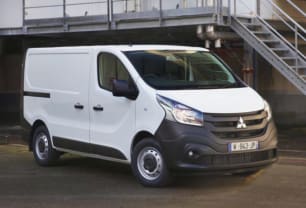There are a few quirks that mean the Tiggo 7 isn't the most practical option in the space, but it hits on some key things regardless.
For a start, the seating position is a little odd. It’s a bit too high which is good for visibility, but not so great if you don’t want to feel like you’re being tossed side-to-side in corners.
And while the seat and wheel have a reasonable range of motion for adjustability, the fixed nature of the dual screens and how close the wheel sits to them will make taller drivers feel like they're peering down on the screens, or that they’re blocked by part of the steering wheel.
At least visibility is excellent out of the cabin and the plush seat trim makes for a comfortable drive.
Also a little strange is the shifter. You need to properly depress the brake pedal to get it to shift into drive or reverse. Simply holding the brake pedal enough for the car to be stopped isn’t good enough, which can be frustrating when you’re trying to do a quick three point turn.
Weird ergonomics aside, there’s enough cabin storage. This consists of a large bottle holder in each door, a further two with spring-loaded edges in the centre console, and there’s a bay for your phone which is also the wireless charger on higher grades. Covering the bottle holder and phone area is a somewhat old-school rolling shutter. Good for cable management, I suppose.
Underneath the bridge-style console is another textured storage area, which is good for loose objects or small bags, and the armrest box is nice and deep too.
This brings us to the screens and lack of dials. On the plus side, there is a dedicated touch panel with shortcuts for most of the core climate functions. This is never as good as having actual tactile buttons and dials, but it’s better than full touchscreen controls.
The screens, meanwhile, are fast and sharp, but the software is downright ordinary, and not good enough if you’re going to make screens such a focal point of the car.
The sheer number of different menus and confusingly labelled tabs within them makes adjusting things on the fly pretty frustrating and there’s something of a learning curve to try and figure all the bits out. The worst part is it’s not even consistent in terms of menu layouts and locations between the Tiggo 7 and Tiggo 8.
The Tiggo 7's digital dash is fine. It’s a dual-dial layout with a few screens on the right side to toggle through. Weirdly the trip computer seems to only record the last 50km in this panel. I wish it was more customisable and presented data in a more attractive way.
At least the wireless Apple CarPlay was seamless and worked well in my time with the cars.
The back seat is a highlight of the Tiggo 7. The abundance of synthetic leather trims continue into the rear doors, as do the soft seat bases. Behind my own driving position (I’m 182cm tall) I had leagues of legroom and headroom was great too. Amenities are okay, with a pocket on the back of each seat, a single USB port, adjustable air vents, and two storage trays. There’s a large bottle holder in each door and in the drop-down armrest, too.
At the time of writing, Chery was yet to provide official figures for the boot space, which is thought to be slightly different from the combustion car. For reference, the combustion car’s boot measures in at 356 litres to the top of the seat backs, which is far from the largest in the category. and frustratingly there’s only a tyre repair kit under the floor as well as the 12-volt battery and high-voltage inverter for the charging system.
It’s important to also call out that the Tiggo 7 Super Hybrid doesn’t get a household power outlet anywhere in the cabin or boot, which feels like a missed opportunity to make the most of its battery.





.png)
